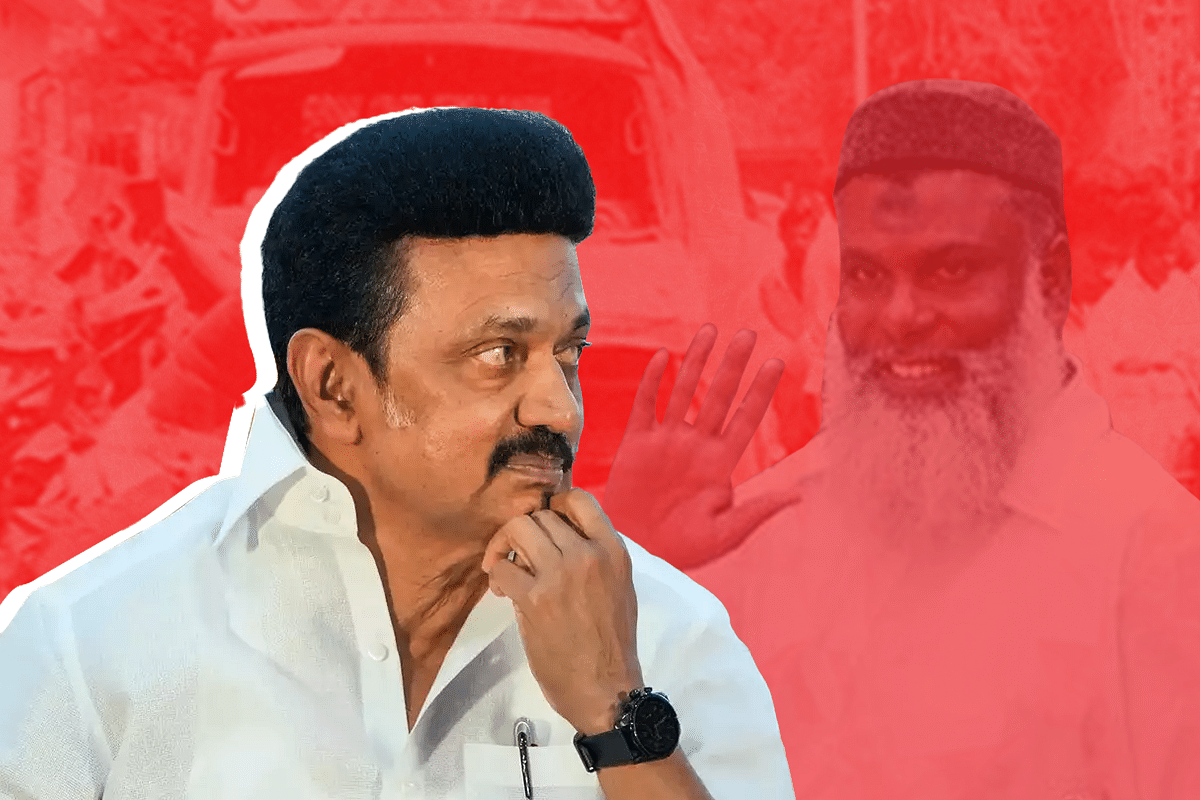States
Release Of Coimbatore Blast Convicts: DMK's Action Is A Dangerous Catalyst For A Race To The Bottom In Appeasing Minorities

Tamil Nadu Chief Minister MK Stalin
A video clip of an interview featuring three people convicted for their roles in the 1998 Coimbatore blasts, who have been released from prison, has been widely shared on social media. In the interview, they profusely thank the Dravida Munnetra Kazhagam (DMK) government and praise Chief Minister M K Stalin, while showing hardly any remorse for their actions.
This comes a few months after the release of S A Basha, the mastermind of the blasts, on interim bail.
While governments routinely release prisoners on occasions like Gandhi Jayanti, the release of these prisoners is different, as it appears to be driven by appeasement politics.
It is also insensitive to the fact that these are not ordinary prisoners, but individuals convicted for bomb blasts that killed 58 people and injured over 200.
Even the Supreme Court, while denying bail to some of these prisoners in October 2023, had called the incident "atrocious" and stated that the nature of the crime, namely the death of 58 people, was sufficient reason for them to remain in jail.
On the fateful day of February 14, 1998, the city was rocked by 13 blasts in a 12-kilometer radius. Among the locations where the blasts occurred were R S Puram, Big Bazaar Street, Oppanakara Street, Coimbatore Medical College and Hospital, and a parking lot at the city's railway station.
Bharatiya Janata Party (BJP) leader L K Advani, who was scheduled to address a rally that day, was among the targets of the conspirators.
While the release of these prisoners, under the pretext of having served long sentences, may bolster the DMK's image, as it could claim to have fulfilled a poll promise and garner support from Muslims in the state who largely support the party or its allies like the Indian Union Muslim League (IUML), Manithaneya Makkal Katchi (MMK), etc., it is not beneficial for the state, as it sends a message that the state is soft on terror.
What guarantee is there that those who have been released will not regroup or join other terrorist organizations? Or that the lenient treatment they have received from the ruling party will not embolden more radicals like them to commit similar acts of violence?
This release also comes at a time when the government should ideally be tightening scrutiny, especially in the aftermath of the blast outside the Kottai Eswaran temple in Coimbatore, which occurred a day before Diwali in 2022.
The BJP, led by its state president K Annamalai, vehemently opposed an Assembly discussion for the release of the convicts that took place in October last year.
He wrote, "Minority appeasement seems to have taken precedence for a few, while the safety of those who elected them has been neglected..." and urged Chief Minister Stalin not to proceed with their release.
Unfortunately for the state, after severing ties with the BJP, the All India Anna Dravida Munnetra Kazhagam (AIADMK) also advocated for the release of the convicts.
The party's recent collaboration with the Social Democratic Party of India, a group known for its radical beliefs and actions in Kerala and Karnataka, suggests that the AIADMK, if it comes to power, is unlikely to reverse such appeasement policies.
If anything, the DMK government's action will likely prove to be a dangerous catalyst for a race to the bottom in pandering to minorities, inviting a spiral of reckless competition from the opposition that threatens to plunge the state into irreversible chaos.
From India to Europe, history has shown that emboldening radicals often leads to disastrous consequences for governments, and this situation is unlikely to be an exception.
Support Swarajya's 50 Ground Reports Project & Sponsor A Story
Every general election Swarajya does a 50 ground reports project.
Aimed only at serious readers and those who appreciate the nuances of political undercurrents, the project provides a sense of India's electoral landscape. As you know, these reports are produced after considerable investment of travel, time and effort on the ground.
This time too we've kicked off the project in style and have covered over 30 constituencies already. If you're someone who appreciates such work and have enjoyed our coverage please consider sponsoring a ground report for just Rs 2999 to Rs 19,999 - it goes a long way in helping us produce more quality reportage.
You can also back this project by becoming a subscriber for as little as Rs 999 - so do click on this links and choose a plan that suits you and back us.
Click below to contribute.
Latest